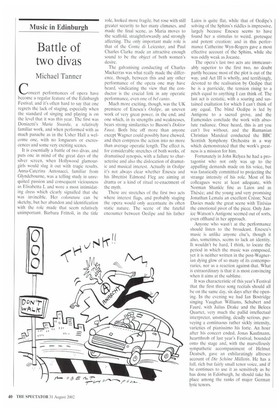Battle of two divas
Michael Tanner
Concert performances of opera have become a regular feature of the Edinburgh Festival, and it's often hard to say that one regrets the lack of staging, especially when the standard of singing and playing is on the level that it was this year. The first was Donizetti's Maria Stuarda, a relatively familiar work, and when performed with as much panache as in the Usher Hall a welcome one, with no longueurs or excrescences and some very exciting scenes.
It is essentially a battle of two divas, and puts one in mind of the great days of the silver screen, when Hollywood glamourgirls would slug it out with tragic results. Anna-Caterina Antonacci, familiar from Glyndebourne, was a telling study in unrequited passion and consequent viciousness as Elisabetta I, and wore a most intimidating dress which clearly signalled that she was invincible. Her coloratura can be sketchy, but her abandon and identification with the role made that seem relatively unimportant. Barbara Frittoli, in the title
role, looked more fragile. but rose with still greater security to her many climaxes, and made the final scene, as Maria moves to the scaffold, straightforwardly and strongly affecting. The only important male role is that of the Conte di Leicester, and Paul Charles Clarke made an attractive enough sound to be the object of both women's desire.
The galvanising conducting of Charles Mackerras was what really made the difference, though, between this and any other performance of the opera one may have heard, vindicating the view that the conductor is the crucial link in any operatic performance, even one of be! canto.
Much more exciting, though, was the UK premiere of Enescu's Oedipe, an uneven work of very great power, in the end; and one which, in its strengths and weaknesses, bears strong similarities to Busoni's Doktor Faust. Both bite off more than anyone except Wagner could possibly have chewed, and then compress the action into no more than average operatic length. The effect is, for considerable stretches of both works, of dramatised synopsis, with a failure to characterise and also the dislocation of dramatic and musical interest. Actually in Oedipe it's not always clear whether Enescu and his librettist Edmond Fleg are aiming at drama or a kind of ritual re-enactment of the myth.
There are stretches of the first two acts where interest flags, and probably staging the opera would only accentuate its often static nature. The scene of the fateful encounter between Oedipe and his father Laios is quite flat, while that of Oedipe's solving of the Sphinx's riddles is impressive, largely because Enescu seems to have found her a stimulus to weird, grotesque and potent creation: and in this performance Catherine Wyn-Rogers gave a most effective account of the Sphinx, while she was oddly weak as Jocaste.
The opera's last two acts are immeasurably superior to the first two, no doubt partly because most of the plot is out of the way, and Act III is wholly, and terrifyingly, devoted to the realisation by Oedipe that he is a parricide, the tension rising to a pitch equal to anything I can think of. The last act is ecstatic, with a soaring and sustained exaltation for which I can't think of any equal. The blind Oedipe is led by Antigone to a sacred grove, and the Eumenides conclude the work with absolute radiance. Once heard, this is art you can't live without, and the Rumanian Christian Mandeal conducted the BBC Scottish Symphony Orchestra in a way which demonstrated that the work's greatness is a mission for him.
Fortunately in John Relyea he had a protagonist who not only was up to the appalling demands made on his voice, but was fanatically committed to projecting the strange intensity of his role. Most of his colleagues were at least adequate, with Norman Shankle fine as Laios and as Thesee; and the young and very promising Jonathan Lemalu an excellent Creon; Neal Davies made the great scene with Tiresias the emotional pivot of the piece. Only Janice Watson's Antigone seemed out of sorts, even offhand in her approach.
Anyone who wasn't at the performance should listen to the broadcast. Enescu's music is unlike anyone else's, though it also, sometimes, seems to lack an identity. It wouldn't be hard, I think, to locate the period in which the music was composed, yet it is neither written in the post-Wagnerian dying glow of so many of its contemporaries, nor as a reaction against that. What is extraordinary is that it is most convincing when it aims at the sublime.
It was characteristic of this year's Festival that the first three song recitals should all be on the same day, six days after the opening. In the evening we had Ian Bostridge singing Vaughan Williams, Schubert and Faure, with Julius Drake and the Belcea Quartet, very much the pallid intellectual interpreter, unsmiling, deadly serious, purveying a continuous rather sickly intensity, varieties of pianissimo his forte. An hour after his concert ended, Jonas Kaufmann, heartthrob of last year's Festival, bounded onto the stage and, with the marvellously sympathetic accompaniment of Helmut Deutsch, gave an exhilaratingly alfresco account of Die Schone Mallerin. He has a full, rich but fairly small tenor voice, and if he continues to use it as sensitively as he has done in Edinburgh, he should take his place among the ranks of major German lyric tenors.


























































 Previous page
Previous page